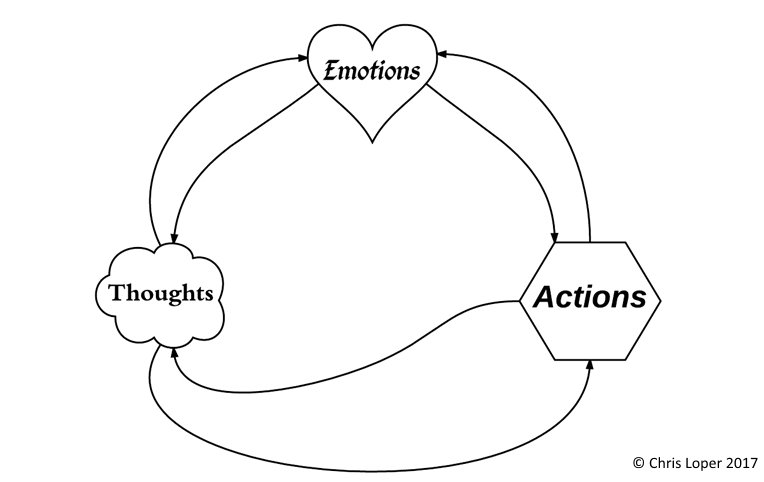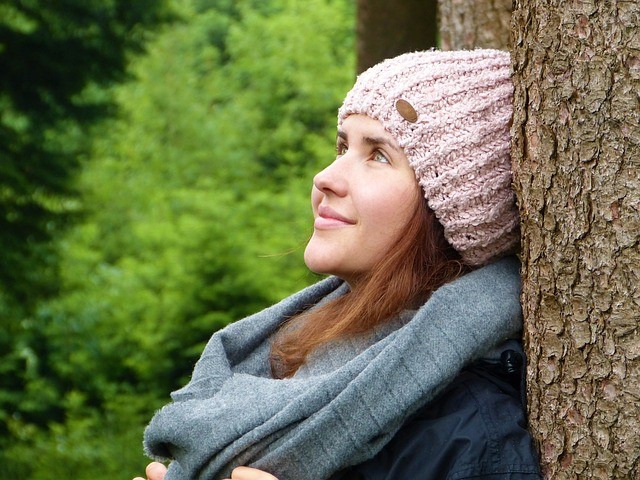
Note: You can find the full loving-kindness meditation script at the bottom of this post.
Of the many different types of meditation, I practice two: breathing meditation and loving-kindness meditation. The purpose of breathing meditation is to develop mindfulness, while the purpose of loving-kindness meditation is to develop compassion, kindness, and altruism.
(You may also hear loving-kindness meditation referred to as “metta meditation” or “loving friendliness” meditation.)1
In loving-kindness meditation, you walk your mind through a series of positive thoughts and positive visualizations. You send well wishes to yourself and your loved ones, your friends and acquaintances, people you dislike, and finally the whole world. The thoughts you repeat to yourself express the hope that people will be happy, healthy, successful, and at peace. And as you think the thoughts, you visualize them coming to fruition.
Now, if you’ve read much of my work, you’ll know that I’m much more interested in positive action than in positive thinking, so my advocating for loving-kindness meditation might come as a surprise. Let me be clear. I’m not suggesting that by thinking these positive thoughts, you’ll activate the so-called “Law of Attraction” and cause good things to come true. That is, in my humble opinion, magical nonsense. The true purpose of loving-kindness meditation is brain training, and research has revealed that the practice has numerous tangible benefits.
The Benefits
Emma Seppala, Ph.D., is the Science Director at the Stanford Center For Compassion And Altruism Research And Education as well as the Co-Director of Wellness at the Yale Center for Emotional Intelligence. Citing numerous research articles, she neatly summarized the benefits of loving-kindness meditation in a blog post titled, “18 Science-Based Reasons to Try Loving-Kindness Meditation Today!” which I’ll further condense here.
Loving-kindness meditation has been shown to:
- Increase positive emotions and life satisfaction
- Decreasing negative emotions and depression
- Strengthen the parts of the brain responsible for emotional regulation
- Reduce self-criticism and increase self-compassion
- Reduce the severity of PTSD and schizophrenia
- Improve the two-way connection between the brain and the cardiovascular system
- Support a healthier response to stress
- Reduce genetic signs of aging
- Reduce symptoms in cases of chronic pain and chronic migraines
- Increase empathy and compassion for others
- Reduce biases against others
- Increase helpful and generous behavior toward others
- Have short-term benefits, noticeable in weeks, as well as long-term benefits that accumulate with continued practice2
In short, loving-kindness meditation can make you happier, healthier, and nicer. It has a positive effect on both your internal state and your actual behavior. It does so, in part, because it directly targets the “Thoughts” component of the feedback loop that controls your life:

I usually advocate for focusing on changing your behavior because actions speak louder than thoughts, but long-term psychological growth requires improving both your thinking and your behavior, and loving-kindness meditation is a powerful way to improve your habitual thoughts.
“The soul becomes dyed with the color of its thoughts.” –Marcus Aurelius3
Translating Aurelius into modern neuroscience, the repetition of particular thoughts causes the brain to rewire (neuroplasticity) and grow (neurogenesis). These neurological changes can be cultivated at any age. The clay never dries.
For all these reasons, long-kindness meditation is arguably more important than breathing meditation. I recall reading somewhere (sadly, I cannot remember where) that the Buddha advised people to do loving-kindness meditation four times as often as mindfulness meditation.
There are many different versions of loving-kindness meditation. What most have in common is that they begin with a focus on you and/or your loved ones radiate out from there in an expanding circle of compassion.
You can follow a script written by someone else, use guided audio, or create your own version of the meditation. The script that I’ve created appears in chunks throughout this post, and in full at the end (after the works cited section) along with a few guided audio choices.
As with breathing meditation, it is typically done sitting up straight in a comfortable position (using a chair is fine), with your eyes closed.
You Begin With Yourself
“Without loving-kindness for ourselves, it is difficult, if not impossible, to genuinely feel it for others.” – Pema Chödrön4
Loving-kindness meditation begins with wishing yourself well, offering yourself compassion and love, and “banishing thoughts of self-hatred and condemnation.”1
Bhante Gunaratana, author of Mindfulness in Plain English, offers this as a way to begin the process:
“At the beginning of a meditation session, say the following sentences to yourself. … really feel the intention:
May my mind be filled with thoughts of loving friendliness: compassion, appreciative joy, and equanimity. May I be generous. May I be gentle. May I be relaxed. May I be happy and peaceful. May I be healthy. May my heart become soft. May my words be pleasing to others. May my actions be kind.
May all that I see, heart, taste, touch, and think help me to cultivate loving friendliness, compassion, appreciative joy, and equanimity. May all these experiences help me to cultivate thoughts of generosity and gentleness. May they all help me to relax. May they inspire friendly behavior. May these experiences be a source of peace and happiness. May they help me be free from fear, tension, anxiety, worry, and restlessness.
No matter where I go in the world, in any direction, may I greet people with happiness, peace, and friendliness. May I be protected in all directions from greed, anger, aversion, hatred, jealousy, and fear.”1
You need not use such a long and complicated opening to your loving-kindness mediation. This simply serves as an example of the spirit of self-compassion from which to begin the practice. It also clearly shows that starting with yourself is not selfish. The intention is not personal gain or self-serving satisfaction. The purpose is expressing to yourself the hope that you will be well enough to be of service to others.
When asked whether or not compassion should be directed at your own self, the Dalai Lama replied: “‘Yourself first, and then in a more advanced way the aspiration will embrace others. In a way, high levels of compassion are nothing but an advanced state of that self-interest. That’s why it is hard for people who have a strong sense of self-hatred to have genuine compassion toward others. There is no anchor, no basis to start from.’”5 In other words, we must first love ourselves before we can offer love to others.

The pattern of self-first in loving-friendliness meditation is echoed in my daily life. I begin each day with a routine of self-care because I know that I cannot fully show up for others if my needs are not met. By taking the time to set my head right for the day before I go out into the world, I’m more likely to be helpful, generous, and kind throughout the day.
However, lovely as Gunaratana’s example is, it is far too much for me to remember. I have made up my own, which is simpler and easier to remember. You are, of course, welcome to use mine, change it, shorten it, or simply write your own.
I love myself.
I love myself.
I love myself.
I will help myself.
I will help myself.
I will help myself.
I will not harm myself.
I will not harm myself.
I will not harm myself.
I will be kind to myself.
I will be kind to myself.
I will be kind to myself.
I will not judge myself.
I will not judge myself.
I will not judge myself.
I am not powerless.
I am not powerless.
I am not powerless.
I don’t need to be powerful.
I don’t need to be powerful.
I don’t need to be powerful.
May I be happy.
May I be happy.
May I be happy.
May I be healthy.
May I be healthy.
May I be healthy.
May I be successful.
May I be successful.
May I be successful.
May I be at peace.
May I be at peace.
May I be at peace.
Then Turn to Family, Friends, and Acquaintances
Having addressed yourself, pick a member of your family – someone you love – and run through the same set of well wishes. As you do so, picture that person receiving each of the benefits you’d like them to have. Feeling compassion for your family is the natural next step in your expanding circle of loving-kindness:
I love my family.
I love my family.
I love my family.
May (name of a family member) be happy.
May ______ be happy.
May ______ be happy.
May ______ be healthy.
May ______ be healthy.
May ______ be healthy.
May ______ be successful.
May ______ be successful.
May ______ be successful.
May ______ be at peace.
May ______ be at peace.
May ______ be at peace.
Next, do the same for a friend, broadening your circle of compassion further still:
I love my friends.
I love my friends.
I love my friends.
May (name of a friend) be happy.
May ______ be happy.
May ______ be happy.
May ______ be healthy.
May ______ be healthy.
May ______ be healthy.
May ______ be successful.
May ______ be successful.
May ______ be successful.
May ______ be at peace.
May ______ be at peace.
May ______ be at peace.
And then picture an acquaintance about whom your feelings are basically neutral, and offer that person the same set of well wishes you’ve already offered yourself, a family member, and a friend:
I love other people.
I love other people.
I love other people.
May (name of an acquaintance) be happy.
May ______ be happy.
May ______ be happy.
May ______ be healthy.
May ______ be healthy.
May ______ be healthy.
May ______ be successful.
May ______ be successful.
May ______ be successful.
May ______ be at peace.
May ______ be at peace.
May ______ be at peace.
Then, you turn your mind toward someone you don’t particularly like. It could be someone you view as an enemy or adversary, someone who has wronged you, or just someone you find off-putting, difficult, or annoying. And to that person, you offer the same set of well wishes:
I love humans.
I love humans.
I love humans.
May (name of a disliked person) be happy.
May ______ be happy.
May ______ be happy.
May ______ be healthy.
May ______ be healthy.
May ______ be healthy.
May ______ be successful.
May ______ be successful.
May ______ be successful.
May ______ be at peace.
May ______ be at peace.
May ______ be at peace.
Well Wishes For People You Don’t Like?
This is often the most uncomfortable part of the practice, and it might be the most important. It’s easy to feel loving-kindness toward your family and friends, and only a small stretch to feel it for a neutral acquaintance, but it can be a serious challenge to offer compassion toward someone you don’t like, especially if that person has done you harm.
This part of the practice is essential, however, because doing so helps to dissolve unnecessary bitterness you’re holding toward that person. It will make you a friendlier, less judgmental person overall, and it will make you happier. A grudge you’re holding against an enemy isn’t affecting that person in the slightest; it’s only harming you.
You don’t have to forgive that person or forget why you dislike them. All you’re doing is recognizing your shared humanity – recognizing that the people you dislike have the same desire to be happy, healthy, successful, and at peace as you do – and, in doing so, you might find some peace yourself.
Now, many people dislike the notion of wishing “success” for such people, but this is a misunderstanding. Bhante Gunaratana explains:
“When we wish success for our adversaries, we don’t mean worldly success or success in doing something immoral or unethical; we mean success in the spiritual realm. … Whenever we say of our adversaries, ‘May they be successful,’ we mean: ‘May my enemies be free from anger, greed, and jealousy. May they have peace, comfort, and happiness.’”1
Furthermore, we can never really know why someone is unkind, so it is wrong for us to judge and condemn them. Gunaratana continues:
“Perhaps that person was brought up under unfortunate circumstances. Perhaps there are situations in that person’s life we don’t know about that cause him or her to act cruelly. … Perhaps even more than our loved ones, our adversaries deserve our kindness, for their suffering is so much greater.”1
This reminds me of the wise words of pastor Will Bowen:
“Those who hurt are hurting.”6
This is why I immediately follow this set of well wishes by thinking the following:
I will not judge people.
I will not judge people.
I will not judge people.
I will be kind.
I will be kind.
I will be kind.
I will help people.
I will help people.
I will help people.
I will lead by example.
I will lead by example.
I will lead by example.
I will also repeat the “I will not judge people.” line to myself at any point during the day if I catch myself being judgmental toward someone. Likewise, if I find myself being unkind toward myself, I’ll repeat the “I will not judge myself.” line from the beginning of the meditation.
And I conclude this portion with “I will lead by example.” because I cannot change the people I don’t like. The way to help them is to do my best to live a good life, and hope that my example will, in some small way, be a positive influence on them. (Click here to read more about the power of leading by example.)
Lastly, You Turn to the Whole World

Loving-kindness meditation concludes by zooming out from your life and the people you know, and extending compassion to the entire world:
I love planet Earth.
I love planet Earth.
I love planet Earth.
May the world be happy.
May the world be happy.
May the world be happy.
May the world be healthy.
May the world be healthy.
May the world be healthy.
May the world be successful.
May the world be successful.
May the world be successful.
May the world be at peace.
May the world be at peace.
May the world be at peace.
This part of the practice is aimed at breaking down the artificial barriers we have in our minds that make us feel separate from the rest of the planet and the other living things that reside here. No less than Albert Einstein once explained why we need to see beyond these barriers and broaden our circle of empathy:
“A human being is part of the whole, called by us ‘Universe’; a part limited in time and space. He experiences himself, his thoughts and feelings as something separated from the rest—a kind of optical delusion of his consciousness. This delusion is a kind of prison for us, restricting us to our personal desires and to affection for a few persons nearest us. Our task must be to free ourselves from this prison.”7
A Personal Ending
For most, the practice ends here, but I’ve developed a personal conclusion to my loving-kindness meditation that you might like. Or you might want to create one of your own. Here it is:
I love life.
I love life.
I love life.
I’m lucky to be alive.
I’m lucky to be alive.
I’m lucky to be alive.
I’m grateful for today.
I’m grateful for today.
I’m grateful for today.
I will not complain or gossip.
I will not complain or gossip.
I will not complain or gossip.
Because complaining only makes things worse, I’m committed to eliminating that behavior from my life.
(thinking of an injured body part)
I’m healing.
I’m healing.
I’m healing.
(thinking of an area of my body I’m strengthening)
I’m getting stronger.
I’m getting stronger.
I’m getting stronger.
(thinking of my improving mental fitness)
I’m becoming better.
I’m becoming better.
I’m becoming better.
(feeling gratitude toward myself for my own self-care)
Thank you.
(feeling gratitude toward the people in my life who help me)
Thank you.
(feeling gratitude toward the world and the universe for providing me with a home)
Thank you.
The Practice and Beyond
It’s okay if the practice feels forced. It becomes more natural the more you do it. It starts to feel more genuine as your brain adjusts to these new thought patterns. This is a long-term effort to reprogram your brain.
“Practicing loving friendliness can change our habitual negative thought patterns and reinforce positive ones. When we practice metta meditation, our minds will become filled with peace and happiness. We will be relaxed. We gain concentration. When our mind becomes calm and peaceful, our hatred, anger, and resentment fade away. But loving friendliness is not limited to our thoughts. We must manifest it in our words and our actions.”1
Positive thinking is only beneficial if it leads to positive actions. The true purpose of loving-kindness meditation is to become a kinder, more loving person in your day-to-day life. The repetition of friendly thoughts steadily shifts your baseline attitude toward greater and greater friendliness. As a result, choosing to be compassionate and generous will become easier and easier.
1 Gunaratana, Bhante. Mindfulness in Plain English. Wisdom Publications, 2011.
2 Seppala, Emma, Ph.D. “18 Science-Based Reasons to Try Loving-Kindness Meditation Today!”
3 Aurelius, Marcus. Meditations. Penguin Classics, 2006.
4 Chödrön, Pema. The Places That Scare You: A Guide to Fearlessness in Difficult Times. Shambhala, 2002.
5 Ben-Shahar, Tal, Ph.D. The Pursuit of Perfect: How to Stop Chasing Perfection and Start Living a Richer, Happier Life. McGraw-Hill Education, 2009.
6 Bowen, Will. A Complaint Free World: How to Stop Complaining and Start Enjoying the Life You Always Wanted. Harmony, 2007.
7 Sullivan, Walter. “The Einstein Papers: A Man of Many Parts.” New York Times. March 29, 1972.
Guided/Scripted Loving-Kindness Meditations
Here are some guided audio versions. None of them perfectly line up with what I practice, but I’ll let you be the judge of their usefulness.
https://onbeing.org/blog/sylvia-boorstein-a-lovingkindness-meditation/
http://www.positivityresonance.com/meditations.html
http://marc.ucla.edu/mpeg/05_Loving_Kindness_Meditation.mp3
https://www.youtube.com/watch?v=mBxsmlMAmnY
And here is my script in full:
I love myself.
I love myself.
I love myself.
I will help myself.
I will help myself.
I will help myself.
I will not harm myself.
I will not harm myself.
I will not harm myself.
I will be kind to myself.
I will be kind to myself.
I will be kind to myself.
I will not judge myself.
I will not judge myself.
I will not judge myself.
I am not powerless.
I am not powerless.
I am not powerless.
I don’t need to be powerful.
I don’t need to be powerful.
I don’t need to be powerful.
May I be happy.
May I be happy.
May I be happy.
May I be healthy.
May I be healthy.
May I be healthy.
May I be successful.
May I be successful.
May I be successful.
May I be at peace.
May I be at peace.
May I be at peace.
I love my family.
I love my family.
I love my family.
May (name of a family member) be happy.
May ______ be happy.
May ______ be happy.
May ______ be healthy.
May ______ be healthy.
May ______ be healthy.
May ______ be successful.
May ______ be successful.
May ______ be successful.
May ______ be at peace.
May ______ be at peace.
May ______ be at peace.
I love my friends.
I love my friends.
I love my friends.
May (name of a friend) be happy.
May ______ be happy.
May ______ be happy.
May ______ be healthy.
May ______ be healthy.
May ______ be healthy.
May ______ be successful.
May ______ be successful.
May ______ be successful.
May ______ be at peace.
May ______ be at peace.
May ______ be at peace.
I love other people.
I love other people.
I love other people.
May (name of an acquaintance) be happy.
May ______ be happy.
May ______ be happy.
May ______ be healthy.
May ______ be healthy.
May ______ be healthy.
May ______ be successful.
May ______ be successful.
May ______ be successful.
May ______ be at peace.
May ______ be at peace.
May ______ be at peace.
I love humans.
I love humans.
I love humans.
May (name of a disliked person) be happy.
May ______ be happy.
May ______ be happy.
May ______ be healthy.
May ______ be healthy.
May ______ be healthy.
May ______ be successful.
May ______ be successful.
May ______ be successful.
May ______ be at peace.
May ______ be at peace.
May ______ be at peace.
I will not judge people.
I will not judge people.
I will not judge people.
I will be kind.
I will be kind.
I will be kind.
I will help people.
I will help people.
I will help people.
I will lead by example.
I will lead by example.
I will lead by example.
I love planet earth.
I love planet earth.
I love planet earth.
May the world be happy.
May the world be happy.
May the world be happy.
May the world be healthy.
May the world be healthy.
May the world be healthy.
May the world be successful.
May the world be successful.
May the world be successful.
May the world be at peace.
May the world be at peace.
May the world be at peace.
I love life.
I love life.
I love life.
I’m lucky to be alive.
I’m lucky to be alive.
I’m lucky to be alive.
I’m grateful for today.
I’m grateful for today.
I’m grateful for today.
I will not complain or gossip.
I will not complain or gossip.
I will not complain or gossip.
(thinking of an injured body part)
I’m healing.
I’m healing.
I’m healing.
(thinking of an area of my body I’m strengthening)
I’m getting stronger.
I’m getting stronger.
I’m getting stronger.
(thinking of my improving mental fitness)
I’m becoming better.
I’m becoming better.
I’m becoming better.
(feeling gratitude toward myself for my own self-care)
Thank you.
(feeling gratitude toward the people in my life who help me)
Thank you.
(feeling gratitude toward the world and the universe for providing me with a home)
Thank you.
